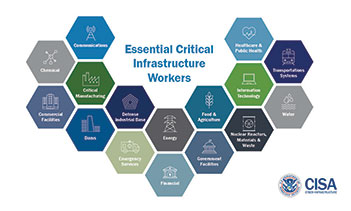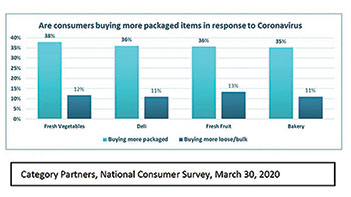 |
|||

|
 |

|
|

|
 |

|
|
 Packaging industry essential to consumers, manufacturers navigating COVID-19 crisis
Packaging industry essential to consumers, manufacturers navigating COVID-19 crisis
By Alyssa Mitchell
 |
 |
MADISON, Wis. — As the COVID-19 global pandemic and “shelter in place” orders impact consumer shopping habits and preferences, the food packaging industry is an essential line of defense in ensuring safe products for manufacturers and consumers.
According to FDA, currently there is no evidence of food, food containers or food packaging being associated with transmission of COVID-19.
“Like other viruses, it is possible that the virus that causes COVID-19 can survive on surfaces or objects. For that reason, it is critical to follow the four key steps of food safety — clean, separate, cook and chill,” FDA says.
The agency also recommends those with concerns wash their hands after handling food packaging, after removing food from packaging, before preparing food for eating and before eating.
Consumers can follow guidelines from the Centers for Disease Control and Prevention (CDC) on frequent hand washing with soap and water for at least 20 seconds and frequent cleaning and disinfecting of surfaces.
“Anyone handling, preparing and serving food should always follow safe food handling procedures, such as washing hands and surfaces often,” FDA adds.
Strict food safety protocols in operations is nothing new to dairy manufacturers or packaging companies, but many are taking extra precautions in light of CDC and Occupational Safety and Health Administration (OSHA) recommendations.
“We have implemented several stringent policies and responsible behaviors to minimize movements, maintain physical distance, impose quarantines and maintain a clean work environment,” says Rebecca Casey, senior vice president of marketing and strategy at TC Transcontinental Packaging.
For example, since the beginning of the crisis, Casey says TC Transcontinental banned any kind of travel, and visitors are not allowed in its facilities.
“We have temperature controls in plants, we added equipment and furniture to encourage physical distance, and all members of our staff who can perform their duties remotely are working from home with connectivity to our production plants,” Casey adds.
Peter Fox, senior vice president of sales for SOMIC America, notes the company’s technicians are trained in good manufacturing practices (GMPs) and practice these hygienic practices as a matter of day-to-day procedures.
“Our service techs are instructed to follow our customer-specific rules and regulations on the manufacturing floor,” he says.
Fox notes from a service perspective, SOMIC has limited the in-plant visits the company can conduct at this time.
“However, we continue to utilize our remote service capability on our machines,” he adds. “This enables us to troubleshoot our machines remotely and communicate with our customers to ensure that our customers are running at maximum efficiencies.”
Along with food manufacturing, the packaging industry is recognized as an essential service by the federal government. Alison Keane, president and CEO of the Flexible Packaging Association (FPA), says there was some confusion on which industries fell under “essential” status when states and the federal government first began to issue “shelter in place” and other safety protocols.
Keane notes about 60% of the industry’s packaging goes to food, and a pretty large percentage goes to health products and medical devices.
“We wanted to ensure from the federal government side we were recognized in the supply chain,” she says. “You have to have the packaging or it’s never going to get to the consumer. We wanted to ensure clarity for the workers and our members and at the federal level that these necessary products would be recognized.”
FPA in late March issued letters to the White House, state governors and Capitol Hill leadership highlighting the need for clarity with respect to federal, state and local government proclamations distinguishing “essential” business operations from mass population event limitations.
The Department of Homeland Security guidance since has been updated under food and agriculture to include specific mention of packaging.
“With this designation, it remains our responsibility to help address the packaging needs of our nation” says Kristy Paulin, corporate communications director for ProAmpac.
Paulin says ProAmpac is taking all measures necessary in following guidance provided by CDC and OSHA to protect its people, operations and customers from the impact of COVID-19.
“We are taking precautions to ensure the availability of our products with minimal to low disruptions as our key suppliers confirm raw material availability,” she says. “As we maintain our operations, we are servicing the needs of all customers in an on-time and in-full basis. Our teams remain available to respond to all customer inquiries.”
Organizations like FPA and the Association for Processing and Packaging Technologies (PMMI) also are offering resources to employers and employees in essential industries like packaging, such as PMMI’s sample letter on its website for companies with essential employees who might be stopped on their way into work (https://www.pmmi.org/coronavirus).
Additionally, FPA is working to help guide companies like SOMIC that have operations in multiple countries.
“We do have some guidance on our site to in regards to some international resources,” Keane says, noting that FPA has been working with packaging stakeholders in Europe so global companies know what to do with their facilities in different places in the world.
“It can be challenging from a supply chain standpoint,” she says, noting while the European Commission has not yet specifically declared the packaging industry as essential for the food and pharmaceutical chains, several countries “on both sides of the Atlantic” have done so.
Meanwhile, a national consumer survey recently released by Category Partners — a strategic insights company focusing exclusively on fresh industries in the retail grocery channel — shows the coronavirus and government quarantines have triggered significant shifts in consumer shopping behavior, packaging preferences and purchase priorities.
According to the national study of 2,000 consumers, survey participants say their food shopping trip frequency is down and basket size is up. In fresh departments, more consumers say they are now looking for more packaged perishable items.
Casey notes that while some of the packaging sector’s markets are experiencing a decrease in volumes due to government restrictions or the economic slowdown, the industries related to food and other essential consumer products, which represent the large majority of the industry’s activities, continue to fully operate in a safe and secure environment.
“We are seeing increased demand on all our cheese retail packages, both private label and branded,” she says. “Our customers increased their volumes to make sure they can meet the demand from consumers.”
Fox says long term, SOMIC believes retail-ready packaging will continue to be a driving force in the market due to the continued effort to reduce retail costs and staffing levels.
“SOMIC’s customer base in the cheese industry, specifically, is running around the clock; therefore, it is absolutely imperative that our cartoners and case packers are running at their maximum efficiencies,” Fox says. “Our ability to support our customers, especially when their staff may be limited, is the primary reason why SOMIC America remains fully operational.”
Keane says dairy products right now are incredibly important because they provide a good source of nutrition with lots of shelf stability.
At the same time, plastic packaging has “gone from zero to hero” overnight because it has such great barrier properties, she adds. “Plastic is very shelf stable and preserves food for a long time.”
Casey agrees, noting the benefits of plastic packaging make sense, especially in times of crisis.
“Plastic packaging protects the product it holds to ensure food security for people from the day it leaves the processing facility to when it arrives in the consumer’s home,” Casey says. “It helps keep the population healthy. Plastic packaging also extends product shelf life in store and at home. It helps reduce food waste.”
In the weeks and months ahead, Casey says TC Transcontinental will continue working closely with its suppliers to ensure stability in its supply chain and, as of today, the company does not foresee any issues.
“Business continuity plans are in place for every plant across our platform, and we have redundancy in our network should we encounter an issue in any one of our facilities,” she says. “Our top priority right now is the safety of our employees and their families to ensure the continuity of our operations as a vital packaging provider to essential services and industries. We are proud to support the vital food industry, and it is our mission in this time of crisis.”
CMN
| CMN article search |
|
|
© 2024 Cheese Market News • Quarne Publishing, LLC • Legal Information • Online Privacy Policy • Terms and Conditions
Cheese Market News • Business/Advertising Office: P.O. Box 628254 • Middleton, WI 53562 • 608/831-6002
Cheese Market News • Editorial Office: 5315 Wall Street, Suite 100 • Madison, WI 53718 • 608/288-9090